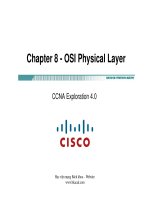Sample questions (CCNA) pdf
Bạn đang xem bản rút gọn của tài liệu. Xem và tải ngay bản đầy đủ của tài liệu tại đây (49.89 KB, 2 trang )
PART I. ENGLISH (5 points ):
Data networks developed as a result of business applications that were written for microcomputers. At that
time microcomputers were not connected as mainframe computer terminals were, so there was no efficient
way of sharing data among multiple microcomputers. It became apparent that sharing data through the use
of floppy disks was not an efficient or cost-effective manner in which to operate businesses. Sneakernet
created multiple copies of the data. Each time a file was modified it would have to be shared again with all
other people who needed that file. If two people modified the file and then tried to share it, one of the sets of
changes would be lost. Businesses needed a solution that would successfully address the following three
problems:
• How to avoid duplication of equipment and resources
• How to communicate efficiently
• How to set up and manage a network
Businesses realized that networking technology could increase productivity while saving money. Networks
were added and expanded almost as rapidly as new network technologies and products were introduced. In
the early 1980s networking saw a tremendous expansion, even though the early development of networking
was disorganized. In the mid-1980s, the network technologies that had emerged had been created with a
variety of different hardware and software implementations. Each company that created network hardware
and software used its own company standards. These individual standards were developed because of
competition with other companies. Consequently, many of the new network technologies were incompatible
with each other. It became increasingly difficult for networks that used different specifications to
communicate with each other. This often required the old network equipment to be removed to implement
the new equipment.
1. What were business applications written for ?
A. mainframe computers
B. microcomputers
C. printers
D. business
2. How many problems businesses needed to successfully solve ?
A. two
B. three
C. four
D. five
3. Which of following was not a solution that businesses needed ?
A. avoid duplication of equipment and resources
B. communicate efficiently
C. increase the cost
D. set up and manage a network
4. When had the network technologies emerged incredibly ?
A. 1990
B. mid-1980s
C. 1970
D. 2000
5. What did businesses realized about networking technology ?
A. increase productivity while saving money
B. save productivity while saving money
C. increase productivity while increasing money
D. save productivity while increasing money
PART II. Choose the correct answer ( 5 points ):
6. Question: What is the decimal number 160 in binary?
a. 10010110
b. 10100000
c. 10101011
d. 10010011
7. What is the function of program named Internet Explorer ?
a. View web site c. download files
b. View images d. all there A, B, C options are correct
8. What of the following is used to describe the rated throughput capacity of a given network
medium?
a. bandwidth
b. base-band
c. latency
d. delay
9. What does DNS stand for ?
a. Domain Name System
b. Domain Name Standard
c. Domain Network System
d. Data Network System
10. What does OSI stand for ?
a. Open Standard Interconnection
b. Open System Interconnection
c. Open System Information
d. Open Standard Information
11. What does WWW stand for ?
a. World Web Wide
b. Web Wide World
c. World Wide Web
d. Web World Wide
12. What does Protocol mean in networking ?
a. All devices use the same Protocol can exchange data with each other
b. A device to protect your Network
c. You need Protocol if the power is lost
d. all A, B, C are wrong
13. What does IP stand for ?
a. Intel Press
b. Internet Press
c. Intel Protocol
d. Internet Protocol
14. What is the hexadecimal equivalent of the binary number 11110000?
a. A1
b. B2
c. C3
d. F0
15. What is the value of ‘1101 AND 1011’ in Bin?
a. 1001
b. 1011
c. Another value









